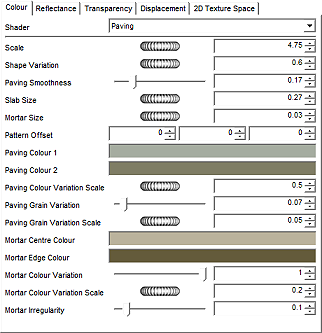Paving
Home > 29 Materials > Color Shaders > Paving
Paving
This solid shader creates a random layout of paving stones, separated by mortar. The stone surface and mortar are defined by two colors each, which are random

Figure 0.0.0.0
Scale: This parameter determines the size of the stones relative to the overall shader pattern.
Shape Variation: This parameter controls the random shape and size of the stones. The higher the value, the more random the stone become. At low values, the stones approach a square grid.
Paving Smoothness: This parameter controls the shape fo the edges of the stones. Low values result in straight and high values in round edges.
Color 1, Color 2: These two colors are blended to create the stone color. Color 1 becomes the base color and Color 2 is superimposed in the form of small speckles.
Color Variation Scale: The two colors are mixed to form a random pattern. This parameter determines the scale of this pattern.
Grain Variation: The pattern of the two colors can be further randomized to resemble small dots of grain. How much grain is produced is determined by this parameter.
Grain Variation Scale: The size of the extra grain is set by this parameter.

|
Stones |
|
|
|
|
|
Size |
25 |
25 |
25 |
25 |
|
Shape |
0 |
30 |
100 |
100 |
|
Smoothness |
0 |
0 |
0 |
0 |
|
Mortar |
|
|
|
|
|
Color Variation |
100 |
100 |
100 |
100 |
|
Color Var. Scale |
20 |
20 |
20 |
20 |
|
Irregularity |
15 |
10 |
0 |
50 |
Figure 0.0.0.15
Mortar: This group of options controls the shape of the mortar.
Size: This parameter determines the thickness of the mortar joints.
Center Color, Edge Color: These are the colors of the joints in the middle and at the edge.
Color Variation: This parameter determines the randomness, when the edge and center color are blended together.
Color Variation Scale: When the edge and center colors are blended, a random pattern is generated. This parameter determines the size of the pattern.
Irregularity: This parameter further specifies the shape of the joints. High values produce rough and broken up joints while low values result in straight and smooth joints.
|
|